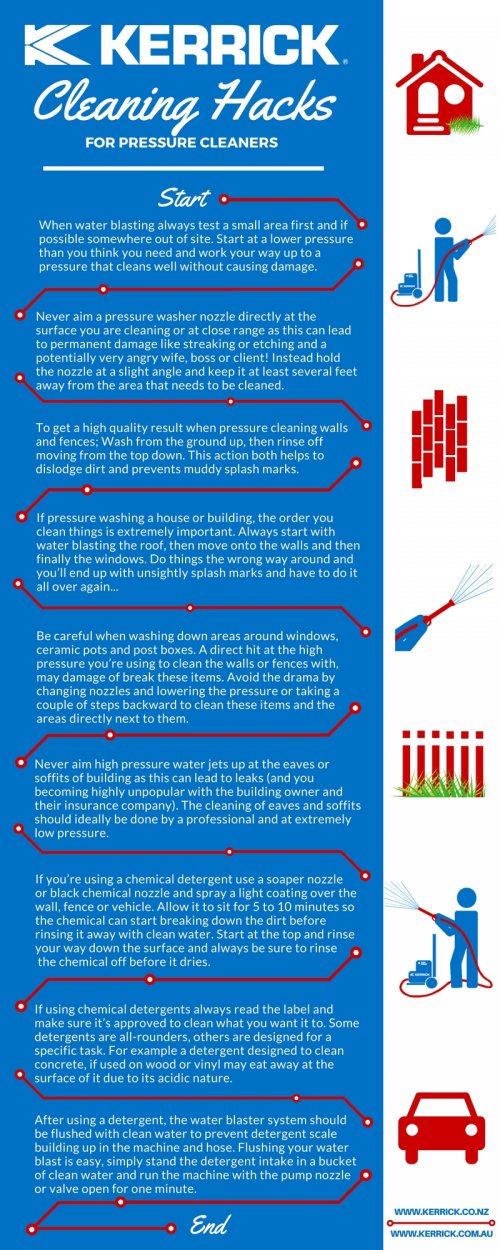
HERE'S THE HANDY TEXT VERSION FOR YOU TO COPY, PASTE & PRINT!
Infographics are great because they make information easy to digest and understand. We also know that they're a nightmare to print which is why we've put the text version below (plus a few other nuggets of wisdom) for you to copy, print and keep with your water blaster for easy reference.
Tips To Make Water Blaster Cleaning Easy
- When water blasting always test a small area first and if possible somewhere out of site. Start at a lower pressure than you think you need and work your way up to a pressure that cleans well without causing damage.
- Never aim a pressure washer nozzle directly at the surface you are cleaning or at close range as this can lead to permanent damage like streaking or etching and a potentially very angry wife, boss or client! Instead hold the nozzle at a slight angle and keep it at least several feet away from the area that needs to be cleaned. The closer you are to something, the higher the pressure, the further away you are the more the pressure drops off. A general rule of thumb is to start far away and work your way closer to the point where your water blaster starts to clean effectively. Then carry out the rest of your water blasting at approximately this distance.
- To get a high quality result when pressure cleaning walls and fences; Wash from the ground up, then rinse off moving from the top down. This action both helps to dislodge dirt and prevents muddy splash marks.
- If pressure washing a house or building the order you clean things is extremely important. Always start with water blasting the roof, then move onto the walls and then finally the windows. Do things the wrong way around and you’ll end up with unsightly splash marks and have to do it all over again (a nightmare nobody needs).
- Be careful when washing down areas around windows, ceramic pots and post boxes. A direct hit at the high pressure you’re using to clean the walls or fences with, may damage of break these items. Avoid the drama by changing nozzles and lowering the pressure or taking a couple of steps backward to clean these items and the areas directly next to them.
- Never aim high pressure water jets up at the eaves or soffits of building as this can lead to leaks (and you becoming highly unpopular with the building owner and their insurance company). The cleaning of eaves and soffits should ideally be done by a professional and at extremely low pressure.
- If you’re using a chemical detergent attach a soaper nozzle or black chemical nozzle and spray a light coating over the wall, fence or vehicle. Allow it to sit for 5 to 10 minutes so the chemical can start breaking down the dirt before rinsing it away with clean water. Start at the top and rinse your way down the surface and always be sure to rinse the chemical off before it dries.
- If using chemical detergents always read the label and make sure it’s approved to clean what you want it to. Some detergents are all-rounders, others are designed for a specific task. For example a detergent designed to clean concrete, if used on wood or vinyl may eat away at the surface of it due to its acidic nature.
- After using a detergent, the water blaster system should be flushed with clean water to prevent detergent scale building up in the machine and hose. Flushing your water blast is easy, simply stand the detergent intake in a bucket of clean water and run the machine with the pump nozzle or valve open for one minute.
- Drain surplus water from hoses before storage. Never leave equipment outside unprotected from the elements. In particular do not allow equipment to freeze in near or sub-zero temperatures. In very cold conditions it may be necessary to protect equipment by flushing it with anti freeze.
General Points to Consider
- Always transport & store the machine in the upright and horizontal position to avoid oil or fuel leaking into the pump or motor.
- To eliminate any impurities or air bubbles from the water circuit we advise starting the cleaner for the first time without the lance and letting the water run out for a few seconds. Impurities could block the nozzle and cause malfunction.
- Always check that your nozzle tip is clicked in properly before using your pressure washer gun. If a nozzle tip isn’t properly attached the pressure of the water tends to blast the nozzle off at high speed which could result in it becoming lost or damaging people or property.
- The use of long extension cords with electric water blasters can result in voltage drop and less effective cleaning performance and worse still premature motor failure. Wherever possible use a direct power source or short extension cables over longer ones.
Remember
- Follow safety instructions.
- Open trigger on gun when starting up and shutting down to back off pressure.
- Do not run the unit dry, always ensure there is adequate water available to the pump.
- Do not leave running with shut off gun closed for more than 1 or 2 minutes.
- If using a petrol or diesel machine, do no operate in a closed area, ensure proper ventilation to avoid breathing carbon monoxide fumes.